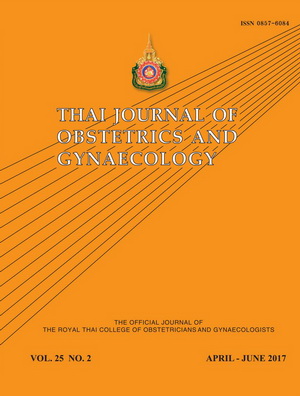Outcomes of Surgery for Pelvic Organ Prolapse in Songklanagarind Hospital, 10 Years’ Experience
Main Article Content
Abstract
Objectives: To evaluate the type of surgery, outcome and peri-operative complication after surgical correction of pelvic organ prolapse in our institute.
Materials and Methods: This was a descriptive study that included 270 women who underwent surgery for pelvic organ prolapse in Department of Obstetrics and Gynecology between January 2001 and December 2011. Demographic data on age, body mass index, parity, route of delivery, previous gynecologic surgery, co-morbidities, and menopausal status were obtained. Clinical symptoms, diagnosis and stage of pelvic organ prolapse, and procedure related data including type of operation, adverse events, and the recurrence rate were reviewed from patient’ charts. Descriptive statistics were used for analysis.
Results: Of the 270 women who underwent pelvic organ prolapse surgery, the mean age was 65.6 years old (range 43-87). Vaginal hysterectomy with anterior colporrhaphy and posterior colpoperineorrhaphy was the most common procedure (220 patients, 81.5%). The most common intra-operative complication was hemorrhage that required blood transfusion (12 patients, 4.4%). The most common post-operative complication was acute urinary retention (28 patients, 10.4%), followed by vaginal hematoma (7 patients, 2.6%). The median length of follow-up was 8 months (range 6-84), and the recurrence rate was 7.8%.
Conclusion: Peri-operative complication related to surgical correction for pelvic organ prolapse was moderate without serious complications occurred.


